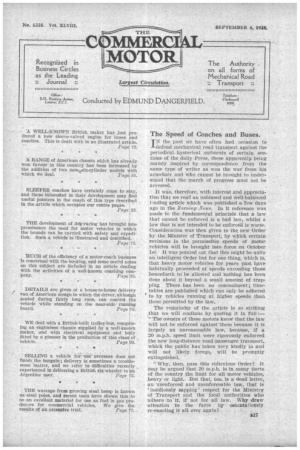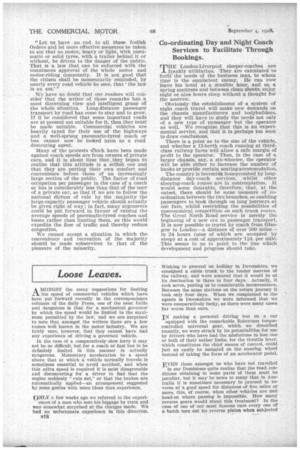The Speed of Coaches and Buses.
Page 1

Page 2

If you've noticed an error in this article please click here to report it so we can fix it.
TN the past We have often had occasion fo -I-defend mechanical road transport against the periodical hysterical outbursts of certain sections of the daily Press, these apparent1y. being mainly inspired by correspondence from the same type of writer as won the war from his armchair and who cannot be brought to understand that the march of progress must not be arrested. .
It was, therefore, with interest and appreciation that we read an unbiased and well-balanced 12ading article which was published a few days ago in the Evening News. In it reference was made to the fundamental principle that a law that cannot be enforced is a bad law, whilst a law that is not intended to be enforced is worse. Consideration was then given to the new Order by the Minister of Transport, by which certain revisions in the permissible speeds of motor vehicles will be brought into force on October 1st. It was pointed out that this might be quite an intelligent Order but for one thing, which is, that -heavy motor vehicles for years past have habitually proceeded at speeds exceeding those henceforth to' be 'allowed and nothing. has been done about it beyond a small amount of trapping. There has been no concealment ; timetables are published which can Only be adhered * to by vehicles running at higher speeds than those permitted by the law.
The remainde,r of the article is so striking that we will continue by quoting it in full :— "The owners of these motors knoW that the law will not be enforced against them because it is largely, an unreasonable law, because, if a 20 m.p.h. speed limit were rigorously enforced the new long-distance road-passenger transport, which the public has taken very kindly to and will not likely. forego, will be promptly extinguished.
"Why, then, pass this ridiculous' Order?' It may be argued 'that 20 m.p.h. is in many Parts of the country the limit for all motor vehicles, heavy or light.-But that; too, is a: dead letter, an unenforced and unenforceable law, that is insidiously sapping' respect for the Ministry of Transport and the local authorities Who adhere to' it, if not for all law. Why draw attention to the farce by -ostentatiously reenacting it all over again? "Let, us have . an end to all these foolish Orders and let more effective measures be taken to see, that no motor, heavy or light, with pneumatic or solid...tyres, with a trailer behind it or without, be driven to the danger of the public. That is a law that can be enforced with the unanimous approval of the whole motor and motor-riding community. It is not good that the citizen shall be momentarily reminded, by nearly every road vehicle he sees. that 'the law Is an ass.' " _ We have no doubt that our readers will consider that the writer of those remarks has a most discerning view and intelligent grasp of the whole situation. Ling-distance passenger transport by road has come to stay and to grow. If it be considered that some important roads are at present not suitable for it, then they must be made suitable. Commercial vehicles are heavily taxed for their use of the highways and a well-sprung pneumatic-tyred coach or bus cannot now' be looked upon as a road destroying agent.
Many of the protests which have been made against coach speeds are from owners of private cars, and it is about time that. they began to realize that this attitude is a selfish one and that they are putting their own comfort and convenience before those of an increasingly large section of the public. The factor of road occupation per passenger in the case of a coach or bus is considerably less than that of the user of a private car, so that if we are to follow the national dictum of rule by the Majority the large-capacity passenger vehicle should actually be given right of way ; in fact, many arguments could be put forward in favour of raising the average speeds of pneumatic-tyred coaches and buses rather than limiting them, as this would expedite the flow of traffic and thereby reduce congestion.
We cannot accept a situation in which the. convenienc.e and recreation of the majority should be made subservient to that of the pleasure of the minority.
Co-ordinating Day and Night Coach Services to Facilitate Through Bookings.
THE London-Liverpool sleeper-coaches are frankly utilitarian. They are calculated to fulfil the needs of the business man, to whom time is the omniscient enemy. He can now leave his hotel at a sensible hour, and on a spring mattress and between clean sheets, enjoy eight or nine hours sleep without a thought for the morrow.
Obviously the establishment of a system of night coach travel will make new demands on the chassis manufacturers and bodybuilders, and they will have to study the needs not only of a new type of passenger, but the operator as well. We recognize that this is an experimental service, and that it is perhaps too soon' to draw conclusions.
There is a point as to the size of the vehicle, and whether a 12-berth coach running at thirdclass railway fares will -allow a Safe margin of profit to the operator. Then, in the case of a -larger chassis, say, a six-wheeler, the operator will be able either to increase the number of bunks or provide certain seating accommodation.
The country is becoming honeycombed by longdistance day-coach services, whilst other sleeping-coach routes are in contemplation. It would seem desirable, therefore, that, at the outset, there should be some measure of coordination between the two branches, so enabling passengers to book throngh on long journeys_ aton'e fare, whilst restricting the possibilities of uneconomical competition on such trunk routes. The Great North Road service is merely the beginning of a new era in passenger, transport. It is now possible to travel by coach from Glasgow to London—a distance of over 500 miles— in 24 hours (nine of which are, occupied by sleep) at. a cost of approximately 11d. per mile. This seems to us to point to the line which development and progress should take.
































